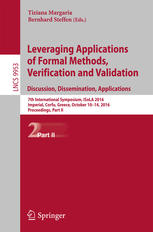

Most ebook files are in PDF format, so you can easily read them using various software such as Foxit Reader or directly on the Google Chrome browser.
Some ebook files are released by publishers in other formats such as .awz, .mobi, .epub, .fb2, etc. You may need to install specific software to read these formats on mobile/PC, such as Calibre.
Please read the tutorial at this link. https://ebooknice.com/page/post?id=faq
We offer FREE conversion to the popular formats you request; however, this may take some time. Therefore, right after payment, please email us, and we will try to provide the service as quickly as possible.
For some exceptional file formats or broken links (if any), please refrain from opening any disputes. Instead, email us first, and we will try to assist within a maximum of 6 hours.
EbookNice Team

Status:
Available4.5
22 reviewsThe two-volume set LNCS 9952 and LNCS 9953 constitutes the refereed proceedings of the 7th International Symposium on Leveraging Applications of Formal Methods, Verification and Validation, ISoLA 2016, held in Imperial, Corfu, Greece, in October 2016.
The papers presented in this volume were carefully reviewed and selected for inclusion in the proceedings. Featuring a track introduction to each section, the papers are organized in topical sections named: statistical model checking; evaluation and reproducibility of program analysis and verification; ModSyn-PP: modular synthesis of programs and processes; semantic heterogeneity in the formal development of complex systems; static and runtime verification: competitors or friends?; rigorous engineering of collective adaptive systems; correctness-by-construction and post-hoc verification: friends or foes?; privacy and security issues in information systems; towards a unified view of modeling and programming; formal methods and safety certification: challenges in the railways domain; RVE: runtime verification and enforcement, the (industrial) application perspective; variability modeling for scalable software evolution; detecting and understanding software doping; learning systems: machine-learning in software products and learning-based analysis of software systems; testing the internet of things; doctoral symposium; industrial track; RERS challenge; and STRESS.